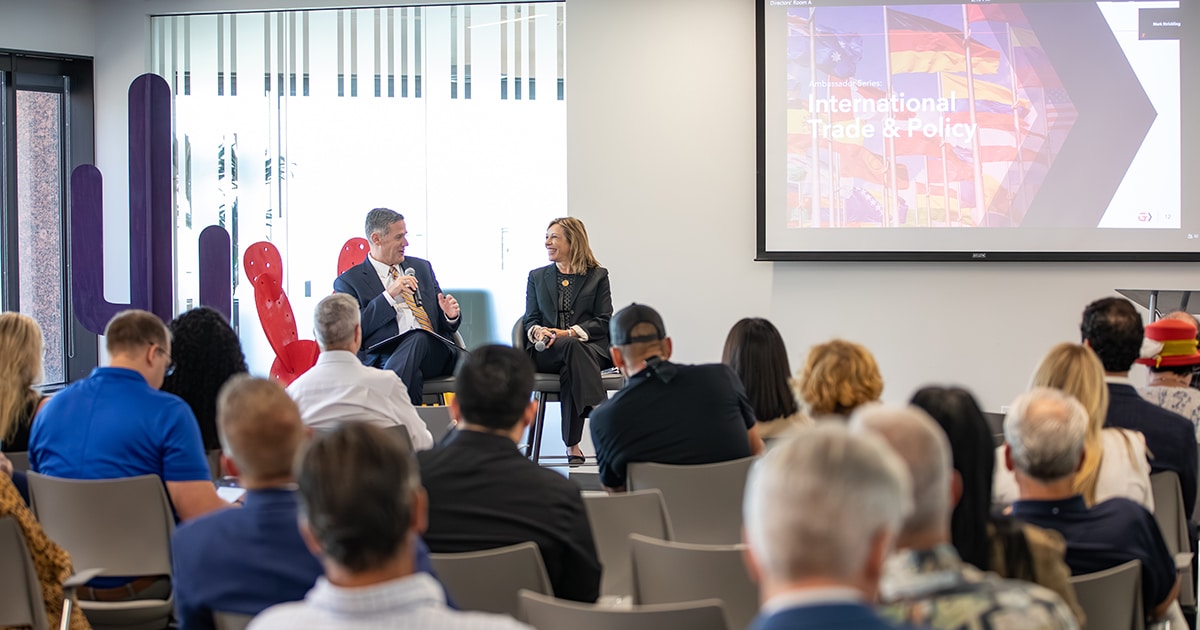

Ambassador Event: International Trade & Policy
Published: 09/23/2025
Updated: 09/22/2025
How relationships with Canada, Mexico and China will affect Greater Phoenix in 2026 and beyond
Given Greater Phoenix’s emergence as an international hub for business, the region must be cognizant of global activity impacting the economies of the United States and Arizona.
After a decade and a half of strategic foreign direct investment (FDI) growth in the U.S., much of which has been centered around Greater Phoenix, a new set of federal priorities has entered the forefront. Onshoring and nearshoring efforts, driven by a variety of initiatives including the CHIPS Act and tariffs, aim to further the country’s advanced manufacturing ecosystem while addressing national security threats from adversaries, namely Russia and China.
Panelists of the Greater Phoenix Economic Council’s (GPEC) first event of the new international-focused Ambassador Event Series discussed decoupling from China, renegotiations of the United States–Mexico–Canada Agreement (USMCA), and more. Panelists were:
- Evelyn Farkas, Executive Director, McCain Institute
- Brett Johnson, Partner, Snell & Wilmer
- Moderator: Thomas Maynard, Interim CEO, Greater Phoenix Economic Council
Greater Phoenix’s position on the international landscape
The 2020s has been an era of acceleration on an international scale for Greater Phoenix. Driven by about $200 billion in semiconductor-related investments and more CHIPS Act funding awarded to Arizona companies than any other state, the region is at the epicenter of federal efforts to reshore manufacturing.
This tremendous growth parallels national efforts, spurred in part by the formation of the federal business attraction organization SelectUSA in 2011. In 2014, GPEC partnered with JPMorganChase and the Brookings Institute to launch the Global Cities Initiative, and in 2017, the city of Phoenix launched its Global Investment Plan focused on Internet of Things and sensor technologies.
The expansions of companies like TSMC, Amkor and LG Energy Solution officially catapulted Greater Phoenix into the global spotlight, and from FY21-25, 26% of all GPEC locates were international companies. At the end of FY25, international companies made up 30% of GPEC’s prospect pipeline.
Growth has exceeded the bounds of the semiconductor industry, with the state opening trade offices in countries including Germany and Japan and direct flights to Taipei set to begin in 2026.
“There’s geographic diversity of where our deal flow is coming from,” Maynard said. “The state opening new trade offices in all these other markets allows us to have a formal presence in some of these countries, and that will only further and more investment from all these different routes."
A shifting relationship with China
If the 2020s is the decade of Greater Phoenix’s international emergence, and the 2010s was a decade of intentional FDI attraction efforts into the U.S., the 1990s and 2000s was an era of evaluating the nation’s relationship with China.
“We came out of the Cold War thinking we could bring China to our side,” Farkas said. The prevailing thought: If the U.S. exhibited the merits free market capitalism, China would gravitate in the same direction. “Instead, they stole our intellectual property [and] used their controlled economy to subvert our national security interests and our companies,” Farkas said.
In the ‘90s and 2000s, the U.S. debated the necessity of protecting its technological edge. At that time, consensus was to “fence off critical technologies,” Farkas said, by enabling advanced manufacturing domestically while permitting standard manufacturing in China.
That policy of fencing shifted toward decoupling in the 2010s, which heightened during the COVID-19 pandemic. In doing so, all manufacturing has been incentivized to relocate on or near the U.S.
“Instead of having operations in China, you would have them in more friendly countries,” Johnson said. “That has been pretty consistent between the [Trump and Biden] administrations.”
Now, the U.S. must decide to what degree it must decouple itself and forecast how the global economy will react if China closes its economy. Farkas projects that too extreme a measure would create a “more draconian system” in China, empower a “dangerous autocrat” and threaten exacerbated upheaval.
“We want China to have a stake in the international trade order, but we want to make sure that we outcompete them, and that’s really what has been the dilemma throughout multiple administrations,” she said.
Tariffs, the CHIPS Act and onshoring
The tactics of Trump and Biden administrations have differed, but the goal of reshoring and onshoring has remained consistent.
For the Biden administration, this came in the form of legislation like the CHIPS Act. Initiated under the first Trump administration and finalized in 2022, the $52 billion program has helped companies like TSMC, Amkor and Intel that operate in Greater Phoenix.
The second Trump Administration has focused on increased tariffs, initially instituted through executive order announcements against Mexico, Canada and China in February. The tariff policies have shifted over the last seven months, but only two countries — China and Canada — have implemented retaliatory tariffs against the U.S. China has been more directly confrontational, as it has boycotted soybean purchases from America, while Canada has sought to diversify its economy by finding other trade partners, Farkas said. Mexico President Claudia Sheinbaum, who initially planned to impose retaliatory tariffs, instead called for negotiations and de-escalation in the aftermath of tariff announcements.
With that said, there has been cooperation between the North American allies. Canada dropped some of its retaliatory tariffs in August, and in September, Mexico announced tariffs that would apply to China as part of the 2026 budget.
USMCA review
These relationships with Mexico and Canada will directly affect negotiations of the USMCA. The agreement is scheduled to begin its six-year review in 2026 following a period of public comment, which opened Sept. 17.
Canada and Mexico are the most important trade partners of Arizona, combining for more than $25 billion in imports and exports from the two countries to the state in 2024. As such, discussions around this agreement will be of the utmost importance to Greater Phoenix.
“It’s one of the most important trade deal negotiations that’s going to happen,” Johnson said.
“I think this is a bipartisan feeling that we have to stick together with Canada and Mexico,” Farkas said.
Representing a market of 500 million people and 30% of global GDP, the USMCA addresses cross-border trade and investments, labor, energy, agriculture, and more, according to the Center for Strategic & International Studies (CSIS). The 2026 review, at one time viewed as largely procedural, is now likely to include negotiations around tariffs, immigration and drug trafficking enforcement, the CSIS predicts.
Johnson said he expects foreign influence in the public comment period, given as it is not made clear where the comments originate. Through this, China has an opportunity to use soft power to sway the direction of the agreement, particularly as it relates to transshipment through Mexico.
“In my opinion, the number one winner out of [the USMCA] is Mexico and the number one loser is China — to the extent that Mexico actually steps up and enforces the agreement to avoid the transshipment,” Johnson said.
GPEC’s Ambassador Events: The international series
After focusing on eight key industries that will affect the future of Greater Phoenix’s marketplace last fiscal year, GPEC’s new Ambassador Event series will center around global relationships.
In addition to subjects like tariffs, the USMCA and onshoring policy, the opening session with Farkas and Johnson touched upon the importance of NATO, America’s relationship with India and Prime Minister Narendra Modi, and the ICE raid on the Hyundai-LG plant in Georgia. Next month’s Ambassador Event will focus on the USMCA.
For more information on GPEC’s Ambassador Program, contact engagement@gpec.org.
Meet the panel
Dr. Evelyn Farkas
Executive Director
McCain Institute
Brett Johnson
Partner
Snell & Wilmer
Thomas Maynard (Moderator)
Interim CEO
Greater Phoenix Economic Council


